Journey
Secondment to the Patent Office
At Canon Intellectual Property, we place great value on developing our staff with a broad and high-level perspective. As one initiative for this purpose, we transfer our staff to Japan Patent Office (hereinafter "JPO") under the personnel exchanges program between the government and the private sector.
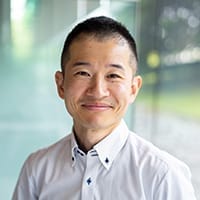
Daisuke Nakagawa (hereinafter “Daisuke”)
- Daisuke focuses his practice on invention discovery, patent filing, and prosecution since 2008.
- He worked in the International Cooperation Division of JPO from 2019 to 2021.
- Through his experience in JPO, he has been hooked on South American countries
- and his current dream is to eat authentic churrasco (Brazilian BBQ) directly on iron skewers in Brazil.
Mamoru Katahira (hereinafter “Mamoru”)
- Mamoru also focuses his practice on invention discovery,
patent filing, and prosecution since 2008. - He succeeded Daisuke and worked in the International Cooperation Division
of JPO from 2021 to 2023. - While he was at JPO, he became interested in the foods that should be eaten with curry
(His preference is curry with chapati rather than with naan).
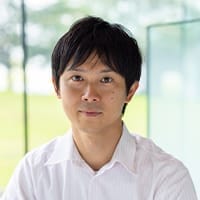
What made you decide to work for JPO?
Daisuke: I had a 10 year career in Canon IP and I loved and enjoyed this kind of work. I especially liked discovering inventions through close communication with engineers. If I say so myself, I have what it takes for this job. But part of me wanted to know if my skills and abilities would work outside of Canon IP. When I told my boss at the time about it, he suggested that I try my hand at working for JPO as a national official.
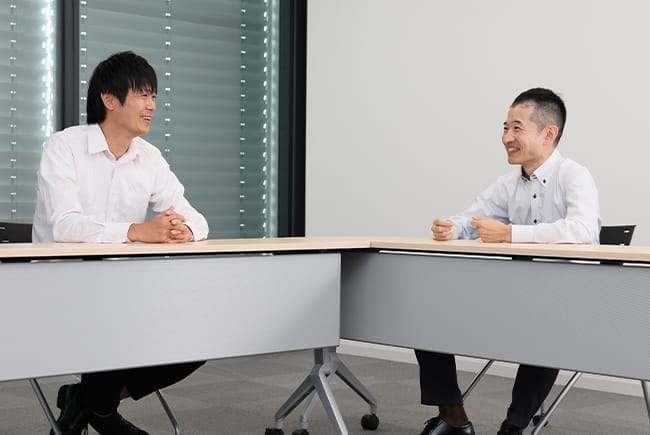
Mamoru: My colleague Ayumi Kabata inspired me. She used to work for JPO as a secondment. At that time, I was just getting used to my new role in my new department of Canon IP, so I was honestly worried that my work environment once would change again. However, my boss generously encouraged me and supported my challenge.
Daisuke:Ayumi currently works at Canon China. She's always very active at the forefront of her work.
When did you start working for JPO?
Daisuke:April 2019. Then I returned to Canon in April 2021. So I worked for JPO for two years.
Mamoru:I succeeded Daisuke and also worked for two years.
Daisuke:We've always been close, so I was very happy to hear that Mamoru was going to be my successor.
Mamoru:Do you remember that I called you right after when I knew I was going to succeed you?
Daisuke:Yeah. You asked a lot about my work in JPO. I immediately understood you were excited but worried at the same time about a big difference in work culture between the "private sector" and the "public sector".
How many years of experience in Canon IP are eligible for the secondment ?
Daisuke:There is no particular rule about it. The opportunities are open to everybody.
Mamoru:In fact, some of my colleagues were seconded after they were five to six years into their careers.
Daisuke:Having said that, I think a certain amount of work experience might practically be required. Because secondees from the private sector are expected to adapt to work in the public sector as quickly as possible and to contribute practically to their work, as well as to share first-hand experience in actual business with them.
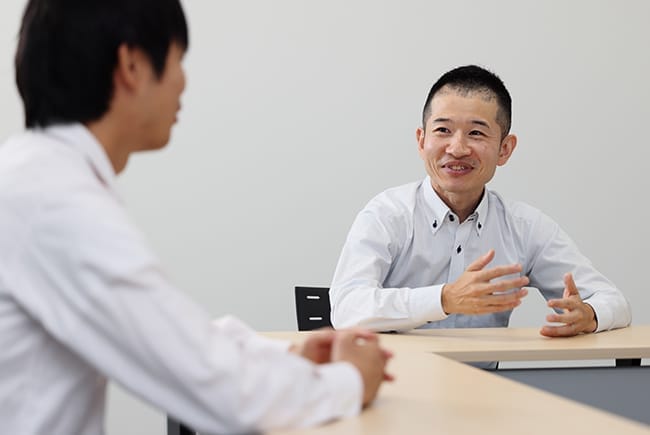
What kind of work did you do at JPO?
Mamoru:We worked in the International Cooperation Division and were involved in international cooperation activities in the field of intellectual property (IP) with developing countries such as ASEAN countries, India, and Brazil. Their IP systems are different from those in Japan, so improving their IP systems toward international harmonization would be helpful for Japanese companies' acquisition and use of IP rights overseas. For that, we negotiated with IP offices in each country.
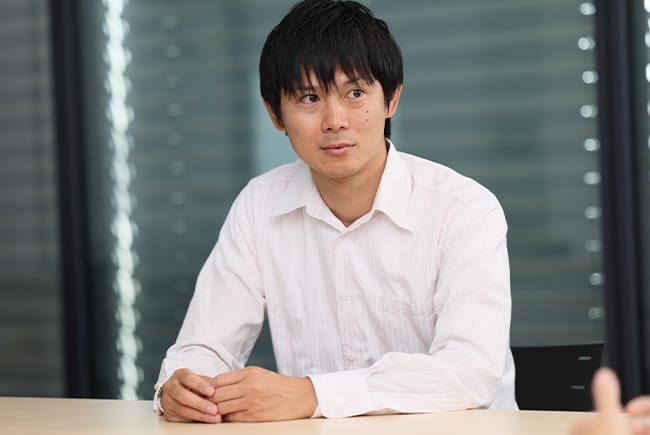
Daisuke:These negotiations were really tough. Because they wouldn't bother to change and improve their operation related to their IP system without any merits for their country. So, we need to explain that they would be able to receive benefits from our cooperative activities and support. For that, we need to accurately investigate and deeply understand their situations and thoughts and positively consider what kind of cooperation and support would be attractive for them. For example, assume that they have an issue with delays in the examination process and are required to deal with huge backlogs. If they are trying to increase the number of examiners, JPO might be able to provide them with the practical examination training for new examiners. On the other hand, if employing a high number of new examiners is practically difficult due to their limited resources, JPO might be able to propose a program to utilize search and examination results between the IP offices so as to reduce the burden of examination. At this moment, I fully understand this kind of negotiations, but when I first begun working for JPO, there were so many things that I didn't know and it took me a bit of time to get used to them.
Mamoru:I couldn't agree more. I studied a lot about my counterparts. For example, when I participated in the Patent Prosecution Highway (PPH) negotiations with the Indian Patent Office (IPO), I learned a lot about India, including not only the IP system, their examination practices and procedures, and India's organization of their government administration, but also the cultural differences between India and Japan, such as ideas towards time, food, religions and so on. While this type of information did not seem directly relevant to the negotiations themselves, it helped to truly understand the IPO counterparts and facilitate negotiations. Because of these experiences, I've come to be very intrigued with India. In fact, I am currently part of a team of experts developing an IP strategy for India in Canon IP.
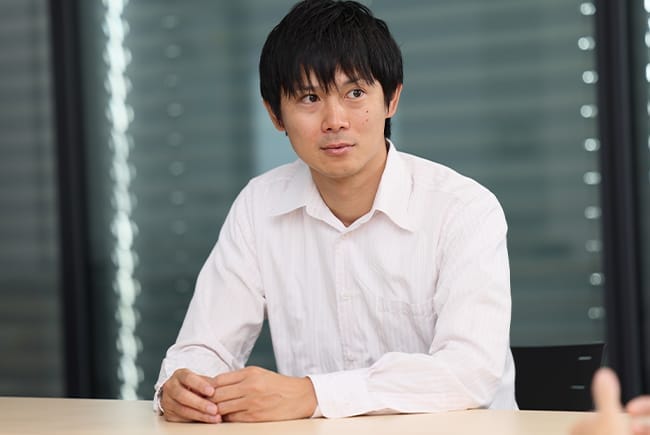
Have you noticed any change in mindset through your work at JPO?
Mamoru:Yes. While in JPO, I had opportunities to work with a lot of government officials including the Ministry of Economy, Trade and Industry, and the Ministry of Foreign Affairs, etc. and I found that they devote their time and effort passionately to helping Japanese companies expand the business overseas. I was truly inspired by their high performance and dedication. After I returned to Canon, I've become to have a strong motivation to contribute to the growth of the Japanese economy from the position from a perspective of one private company.
Daisuke:It might sound like an exaggeration, but I think the way I look at things has completely changed. In fact, from the first day, I was really shocked and confused since the ways of thinking in Canon didn’t work at JPO. I went through the cultural differences between the public and private sectors and it took me a little while to adapt them. At that time, I truly understood the saying "doubt the obvious." Also, through communication with my counterparts abroad I learned that Japanese ways of thinking don’t always apply in other countries. I became acutely aware that there are many countries around the world, each with a different culture and different ways of thinking.
Mamoru:International cooperation activities, even in the field of IP, are part of diplomatic negotiations between countries and are strongly affected not only by cultural differences but also by geopolitical conditions. This required us to have an outlook on a larger and broader perspective in the context of Japan's international relations with other countries.
Daisuke:That’s right. Through these experiences, I once again realized the importance of “dialogue.” We can’t just expect our counterparts to understand what we are thinking, we need to explain properly and carefully. And we need to throw away our biases and assumptions and listen carefully to what they are saying, with an open mind. I firmly believe it is only through the process of careful dialogue that we can overcome the differences in positions and culture between each party to be on the same page, so that we can think about and develop a constructive solution that is a win-win for both parties.
Mamoru:And this can be applied to anything in our work.
Conclusion
Daisuke:Looking back, I think it was a wonderful two years. I would like to express my gratitude to our company for providing me with the opportunity and to everyone at JPO that I worked with for two years.
Mamoru:I hope to take advantage of the experience gained over the past two years and do work that has a positive impact on the economic growth of Japan and foreign countries from the position as one private company.

